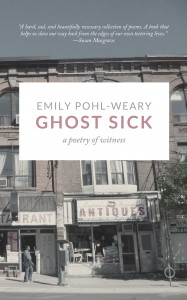 Emily Pohl-Weary, 106 pgs, Tightrope Books, tightropebooks.com, $19.95
Emily Pohl-Weary, 106 pgs, Tightrope Books, tightropebooks.com, $19.95
Subtitled “a poetry of witness,” this latest book from author, arts educator and former Broken Pencil co-editor Emily Pohl-Weary is unified by violence. Economic, sexual, institutional, mundane or exceptional, Ghost Sick chronicles the violence that we do not often enough acknowledge bubbling beneath the genteel streets of Toronto. But more than a chronicle, this book offers a serious contemplation of social problems that affect us all, and points us towards ways to help, to resist.
Written in response to a shooting in her community, Pohl-Weary’s verse has a tone that is respectful without being precious and takes sides without sacrificing nuance or complexity. Though some of the narrative and emotional content of the pieces covers territory that is not new, her self-conscious style ensures that, as she writes in “The First Time,” she only offers “clichés for good reasons.”
Ghost Sick is a book that at times takes on uneasy contradictions, as in “Vigilante Justice,” where the narrator examines how murder helped her, “a pacifist / understand an eye for an eye.” But at other times Pohl-Weary delivers straight-forward narratives that provide simple but powerful resonances, as in “Fairy Tale,” a queer growing-up story told in eight stanzas.
Pohl-Weary’s poems are diverse in form, her lines ranging from the conversational to the more playfully poetic. As individual pieces, many are masterful; others are less successful. That said, even the weaker pieces contribute significantly to the themes and impact of the book as a whole. The poems in Ghost Sick coalesce into a very strong, coherent collection that should be read from cover to cover.
“You must live for those who died,” Pohl-Weary writes, and the poems that comprise Ghost Sick are a harrowing and inspiring explication of what that might mean. Though composed in response to tragedy, this is a book that looks forward towards a better city, better citizens, and a better society. (Andrew Woodrow- Butcher)
